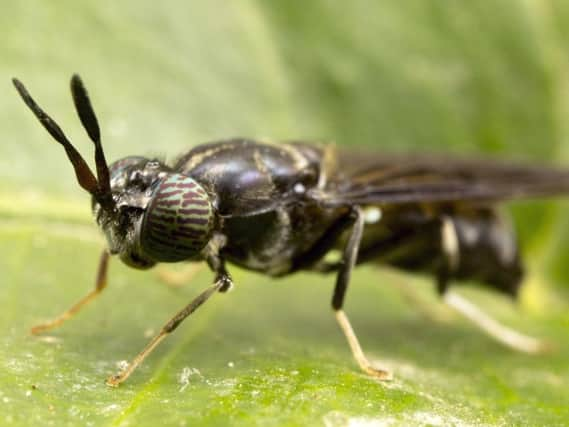Bug farming set to create a buzz in Scotland


The publication, for Zero Waste Scotland (ZWS), analyses the economic potential of insect farming.
It suggests rearing bugs, which can be used to make feed for animals and humans, organic fertilisers and even green fuel, offers a sustainable way to produce more food using less resources.
Advertisement
Hide AdAdvertisement
Hide AdAnd Scotland is an ideal location due to its massive aquaculture industry, vast supplies of organic feed stock and academic expertise.
Nearly 500,000 tonnes of agricultural feedstock is chucked away in this country each year, but the report suggests that using just a tenth of it for insect farming could generate an extra £5.4 million for the Scottish economy.
Dr William Clark, ZWS’s bio-economy specialist, wrote the new guidance for would-be insect farmers as changing regulations open up more markets.
He said: “Farming insects in Scotland might sound unlikely or unappetising but it could play a significant role in solving Scotland’s food waste problem and reducing our reliance on imported crops like soy for agriculture and aquaculture, which drives up the carbon emissions behind the climate crisis.
“Insect farms offer a reliable, sustainable, circular-economy solution to the protein gap. For although the world produces enough food for everyone, more than a third of it goes to waste so people don’t get the protein they need.
“On top of that, farming insects can also produce valuable by-products such as biodiesel, bioplastics and organic fertilisers.”
European Union regulations introduced in 2017 allow farming of seven insect species, including field crickets and black soldier flies.
Farms can be powered by waste heat from other processes, while the grubs can be fed on pre-consumer food waste from supermarkets, arable farms and bakeries.
Advertisement
Hide AdAdvertisement
Hide AdThe insects can then be fed to farmed fish or used to make pet food.
The Scottish Aquaculture Innovation Centre estimates that demand for insect protein from fish farming alone is worth more than £25 million per year.
Black soldier flies have been highlighted as a suitable species for cultivation in the UK as they do not carry human or livestock diseases and their tropical origins mean they do not pose a risk of becoming an invasive species.
As yet Scotland has no insect farms, but Dr Clark believes the sector offers enormous potential.
And to start up in business requires a relatively small outlay, compared to conventional farming.
“You can set up an insect farm in a few shipping containers,” he said.
“You don’t need the acres of fields which traditional farming requires to feed more typical livestock, so insect farms aren’t competing for the same limited resources, like land and water.
“They can produce about 100 times more protein per year from the same amount of space than you would get by farming chicken or cattle.
Advertisement
Hide AdAdvertisement
Hide Ad“Scotland’s food waste could support dozens of insect farms and jobs.
“Firms and governments around the world are already reaping the economic and environmental benefits of investing in this innovative approach.
“It’s time Scotland did the same.”
Early in 2020 EU laws are expected to be extended to allow insects to be farmed to produce feed for poultry and pigs too.
Regulations covering novel foods were updated in 2018 to include farming insects to produce food for people direct.
Nearly £1.1 billion of food is binned every year in Scotland alone.
In terms of carbon emissions, food waste is bad for the environment.
When thrown away, not only its nutritional value wasted but also the water, soil, nutrients, work hours, energy, transport and plastic packaging involved in producing and selling it.
Thomas Farrugia is the founder of pioneering Edinburgh-based firm Beta Bugs, which breeds black soldier flies to supply insect farms.
Advertisement
Hide AdAdvertisement
Hide AdHe says a growing number of people, including regular farmers, are showing interest in the emerging sector.
He said: “It’s great that Zero Waste Scotland has produced this guidance, which really ties into the interest we’re seeing in diversification from traditional farmers and other businesses.
“More and more people are asking us about this. They are thinking that in the future traditional livestock-rearing might not be an option and this could be the next thing.
“Chicken farming started with farmers wanting to diversify. First they cleared some space for a
single chicken shed, which worked well, so then over time they put up more sheds and eventually became chicken farmers.
“The same could well happen with insects.”